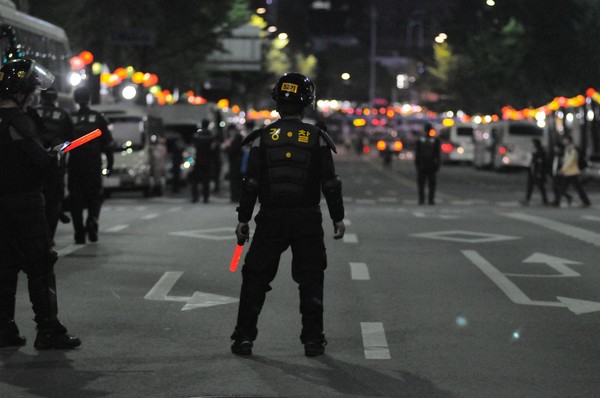Protests founded the South Korea we know now. And this is not an overstatement.
In 1960, protests during the April Revolution stymied Syngman Rhee’s attempt to continue his dictatorial rule. The May 18 Gwangju Democratization Movement in 1980 became the cornerstone for the protests that followed, eventually leading up to the amendment of the Constitution in 1987, which allowed the direct election of the president. As such, it is impossible to discuss the modern history of democratic South Korea without mentioning protests.

This is perhaps why the Korean National Police Agency’s revision scheme for the Assembly and Demonstration Act appears unsettling to some South Koreans. In fact, not all parts of it are unwelcomed. The current law requires sound levels to be measured every 10 minutes and prevents protests “before sunrise and after sunset” with exceptions. The revision scheme will strengthen these measures by reducing the time intervals between sound level measurements to five minutes and specifying when protests cannot happen — midnight to 6 a.m. — without any exceptions. Citizens in protest-prone areas expect these changes to minimize disturbing noise, disruption in traffic, and other inconveniences caused by protests.
What arouses concern is that the suggested revision will strengthen police’s capacities pre-, mid-, and post-protests. The police will be able to reject an organization’s registration for protest if they deem it as hindering public security, and gain expanded exemption rights regarding any legal consequences that arise while they control protests. Currently, aspiring protestors just need to report to the police beforehand, but with the revision, they will need to get the permission of the police. From a bird’s-eye view, this seems unproblematic — what’s wrong with banning threatening organizations from protesting and protecting police officers who work to safeguard citizens’ safety?
The issue lies in this very point. Who decides what is “threatening”? As of now: the police. How will they define that? Unclear. In other words, in the worst-case scenario, the police could suppress the protests of organizations or even curb them so that they cannot happen in the first place, based on their own judgment that isn’t entirely based on the consideration of public justice. Moreover, how far the police can go to maintain public order is also quite vague. Again, in the worst-case scenario, the police may use violence in the name of protection. The apprehension is, how much will this differ from the past, when reasonable protests were violently repressed because they proved threatening not to public justice but to the dictatorial government?
This could be a way-too-stretched interpretation of a small part of the attempted revision. However, the allegedly slim yet existent chance that this will infringe on the democratic spirit that the nation is founded upon, as well as the notion that a civil force can control the expression of citizens’ opinions to a large extent, are nonetheless disturbing; this is a violation of the Constitution at the outset.
Still, it is worthwhile to review the pitfalls of the modern protest culture in South Korea and the reasons the police’s proposal is gaining momentum. To begin with, there were many protests in the past that have caused disruption. For example, in June, there was a protest against the forced expropriation of land in front of the apartment where the Minister of Land, Infrastructure and Transport lives. Those residing in surrounding areas had to endure loud noise from loudspeakers and amplifiers even until late night. Regardless of the purpose, such protests interfere with the lives of those living or working near the area. This makes it understandable why some think that protestors have more rights than they should have, to the point where they are contravening others’ rights. In addition to this, some parts of the current act are rather ambiguous. For example, stating that protests should not be held “before sunrise and after sunset” poses confusion, as this time period changes for every occasion. Hence, some parts of the revision put forward should indeed be considered thoroughly.
Nevertheless, the crux of improving the Assembly and Demonstration Act should not be increasing the power of a particular group, as this will cause further problems that might, in the end, betray the very ethos that this country was founded on. The focus should really be on tackling the citizens’ concerns in detail and making appropriate changes to them; this is the direction we must proceed in order to preserve the democracy that all South Koreans deserve.

